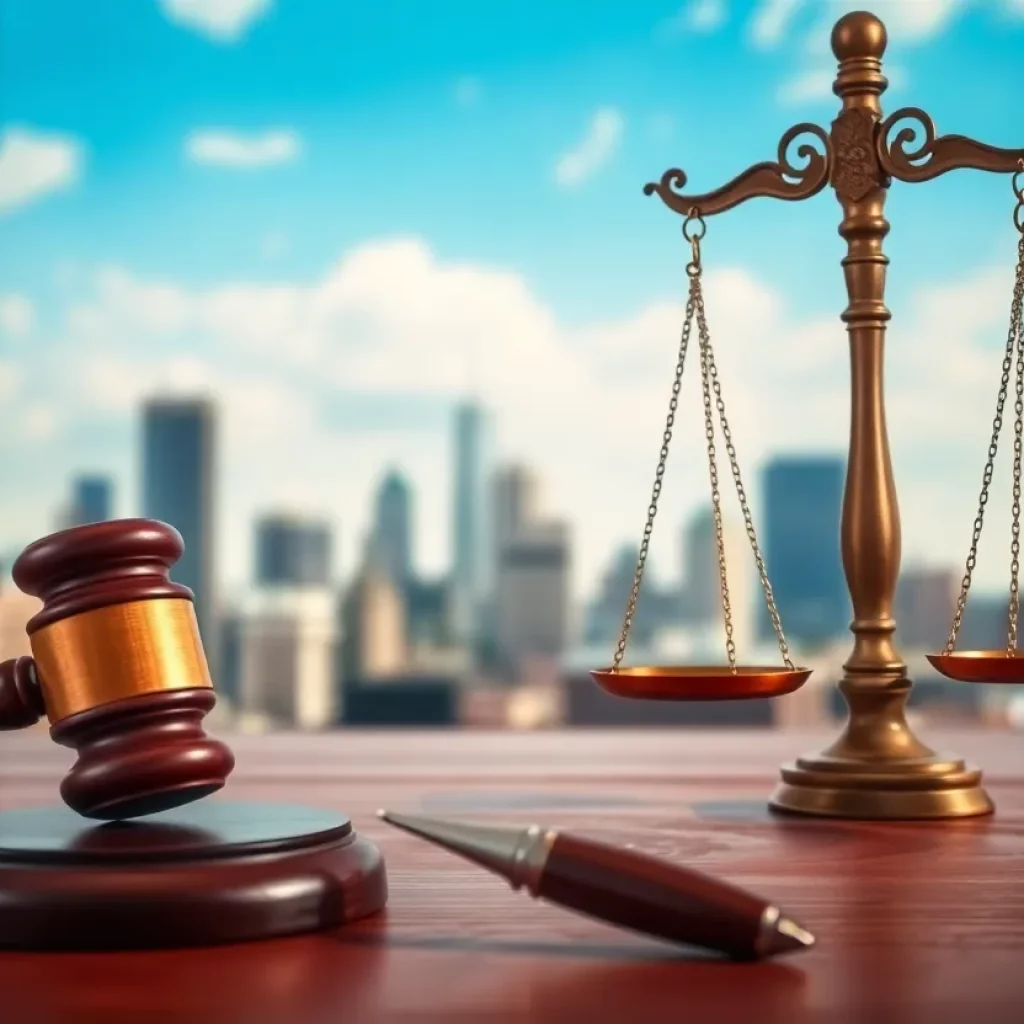News Summary
Silvia Delgado García, known for her defense of drug lord Joaquín ‘El Chapo’ Guzmán, was elected as a criminal judge in Ciudad Juárez. This marks Mexico’s first-ever judicial elections, but her victory has sparked controversy due to allegations linking her to organized crime. With voter turnout at a historic low of 13%, concerns arise regarding the independence of the judicial system and potential influences from criminal groups. As Delgado takes on her new role, the implications of this election on Mexico’s legal landscape remain uncertain.
Former Lawyer for “El Chapo” Elected as Judge Amid Controversy
Historic Judicial Elections in Mexico
In a groundbreaking turn of events, Silvia Delgado García, notable for her role as a defense attorney for the infamous drug lord Joaquín “El Chapo” Guzmán, has made history by being elected as a criminal judge in Ciudad Juárez, Mexico. This election, which took place on June 1, marked Mexico’s first-ever judicial elections, aimed at reforming the country’s approach to justice and creating a more democratic judiciary.
Delgado’s candidacy was met with a storm of controversy, as allegations emerged from a transparency organization linking her to organized crime. Such claims have raised eyebrows and called into question her commitment to impartiality in the judiciary. However, Delgado defended her legal representation of Guzmán as an essential aspect of her professional duties, asserting that it did not equate to a conflict of interest.
The Journey of Silvia Delgado
At 51 years old, Delgado boasts an impressive 18 years of experience in criminal law. Before her involvement with Guzmán, she gained significant legal expertise through various positions and educational achievements, including a master’s degree in law. Her defense of Guzmán occurred prior to his extradition to the United States in 2017, where he was ultimately convicted of drug trafficking in 2019 and is currently serving a life sentence in a supermax prison located in Colorado.
As part of her campaign, Delgado emphasized her extensive background and commitment to fair judicial processes. She highlighted that her representation of Guzmán was a fundamental legal right, a stance that appeals to many advocates of legal representation.
Low Voter Turnout and Concerns of Judicial Independence
Despite Delgado’s electoral victory, the event was overshadowed by the abysmal voter turnout of just 13%, marking it as the lowest in any federal vote in Mexico’s history. This poor participation signals a lack of enthusiasm among the public regarding the selection of judges via direct elections. Critics have warned that this judicial election could compromise the independence of the judiciary, raising fears that such reforms might pave the way for greater political influence and potential organized crime infiltration within the legal system.
President Claudia Sheinbaum, however, insisted that the elections were a success, casting aside concerns about voter engagement as critiques from various experts highlighted the risks posed by the new system. The push for these reforms was initially championed by the governing Morena party, targeting democratization of the judiciary and replacing the previous method—which relied on examinations and professional experience—to fill over 2,600 judicial positions, including local judges and Supreme Court members.
Potential Impacts of Judicial Reforms
The overhaul of the electoral process, although presented as a method to enhance democracy, has been met with skepticism. Legal scholars and anti-corruption activists observed that this new system allows candidates to be vetted with minimal requirements, creating a vulnerability to criminal groups possibly stepping in to influence outcomes. Miguel Alfonso Meza, an anti-corruption advocate, voiced concerns over the efficiency and safety of the vetting process, as it scrutinized more than 50,000 candidates within a brief period.
Critics continue to express that allowing judges to be elected by popular vote could lead to a disturbing trend where crime syndicates gain considerable influence over legal rulings. This apprehension is especially relevant for a nation still grappling with the devastating impacts of organized crime.
The Road Ahead for Delgado
Delgado’s path as a newly appointed criminal judge will be closely watched as she navigates her duties amid lingering questions about her past associations. Following her election, she has chosen to remain tight-lipped until the official confirmation of her victory is announced. Her role may prove to be a litmus test for the efficacy and integrity of the new judicial election framework in Mexico, a change that holds the potential for both advancement and risk in the nation’s legal landscape.
As the judicial reform saga unfolds, citizens of Ciudad Juárez and beyond remain hopeful—yet cautious—about the implications of these significant transformations within the judicial system.
Deeper Dive: News & Info About This Topic
HERE Resources
Shannon Taylor: The Lawyer Targeting Virginia’s Attorney General Seat
Lawyer Arrested in El Salvador Amidst Authoritarian Concerns
Indigenous Lawyer Hugo Aguilar to be Mexico’s Chief Justice
South Carolina Solicitor David Pascoe Joins Republican Party
South Carolina Senate Votes to Remove Treasurer Loftis
Solicitor David Pascoe Switches to Republican Party
Controversial Lawyer Moves in Wisconsin Supreme Court Race
Elon Musk’s Impact on Wisconsin Supreme Court Election
Wisconsin Lawyer Challenges Elon Musk’s Voter Giveaway
Legal Turmoil Surfaces in Wisconsin Supreme Court Race
Additional Resources
- Concho Valley Homepage: Former Lawyer for “El Chapo” Elected as Judge Amid Controversy
- Concho Valley Homepage: Historic Judicial Elections in Mexico
- Concho Valley Homepage: Low Voter Turnout and Concerns of Judicial Independence
- Concho Valley Homepage: Potential Impacts of Judicial Reforms
- Concho Valley Homepage: The Road Ahead for Delgado
- Wikipedia: Joaquín Guzmán
- Google Search: El Chapo
- Google Scholar: Judicial Reforms Mexico
- Encyclopedia Britannica: Mexico Judiciary
- Google News: Judicial Elections Mexico
Author: STAFF HERE CHARLESTON
The CHARLESTON STAFF WRITER represents the experienced team at HEREcharleston.com, your go-to source for actionable local news and information in Charleston, Charleston County, and beyond. Specializing in "news you can use," we cover essential topics like product reviews for personal and business needs, local business directories, politics, real estate trends, neighborhood insights, and state news affecting the area—with deep expertise drawn from years of dedicated reporting and strong community input, including local press releases and business updates. We deliver top reporting on high-value events such as the Spoleto Festival USA, Charleston Wine + Food Festival, and the MOJA Festival. Our coverage extends to key organizations like the Charleston Metro Chamber of Commerce and the Charleston Museum, plus leading businesses in tourism and maritime industries that power the local economy such as South Carolina Ports Authority and the Charleston Visitor Center. As part of the broader HERE network, including HEREaiken.com, HEREbeaufort.com, HEREchapin.com, HEREcharleston.com, HEREclinton.com, HEREcolumbia.com, HEREgeorgetown.com, HEREgreenwood.com, HEREgreenville.com, HEREhiltonhead.com, HEREirmo.com, HEREmyrtlebeach.com, HEREnewberry.com, HERErockhill.com, HEREspartanburg.com, HEREaustin.com, HEREcollegestation.com, HEREdallas.com, HEREhouston.com, and HEREsanantonio.com, we provide comprehensive, credible insights into South Carolina's dynamic landscape.










